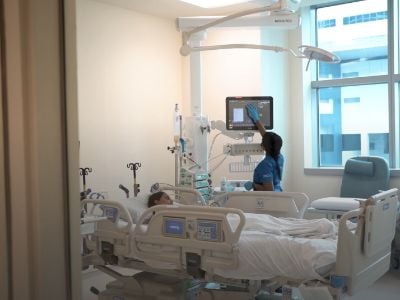Published on 28 October 2021
The ongoing pandemic has made a big impact on the way we live, work and play. One of the biggest changes has to be how it has impacted our social lives.
With less daily marketing, community gatherings and group exercises, older adults may be finding themselves moving a lot less than they used to. The impact of this sedentary lifestyle is especially pronounced for older adults.
According to Ms Tou Yu Fang, a physiotherapist at Jurong Community Hospital (JCH), increased time sitting around the house can result in the gradual loss of stamina and endurance as well as muscle strength. “This increases the risk of a condition known as sarcopenia,” she said.
Sarcopenia is a syndrome where there is progressive and generalised loss of muscle mass and strength. It is strongly correlated with physical disability, poor quality of life and death. “Research has shown that as much as 5% of muscle mass is lost with each day of bedrest,” Ms Tou added.
This underscores the importance of raising levels of activity among older adults. In fact, Ms Tou emphasised that the benefits of exercise are not just to prevent sarcopenia. It also enhances general health and even improves the management of chronic diseases such as high blood pressure, high cholesterol, diabetes, heart disease, stroke, osteoporosis, asthma and chronic obstructive pulmonary disease (COPD).
“Keeping active helps in the fight against these chronic diseases,” Ms Tou shared.
According to her, the benefits are wide-ranging and exercise can:
Fight diabetes by lowering blood sugar levels and improving insulin sensitivity
Help improve lower high blood pressure levels
Be beneficial in tackling high cholesterol – and apart from lowering bad cholesterol, has the added benefit of raising good cholesterol
Play an important role in stroke rehabilitation and help in regaining mobility, strength and quality of life
Be useful for those with heart disease, as suitable amounts of appropriate light exercises can actually strengthen the heart and boost heart health
Boost energy levels and physical fitness in those with kidney disease or who are on dialysis. It can also reduce inflammation
Promote efficient oxygen delivery to the breathing muscles and promote efficient breathing patterns, thus benefiting those with asthma and COPD.
Build stronger bones and reduce the risk of fractures in people who have osteoporosis
Lower the risk of dementia and other neuro-cognitive disorders, as well as improve brain function in terms of decision-making, attention, processing speed and memory
Ultimately, research shows that regular exercise – as little as 30 minutes a day, six days a week – is enough to make a positive impact on the overall health and wellbeing of older adults – even increasing life expectancy by over 40%. All it takes is a light walk, some stretches and even some strength exercises to reap the benefits.
In consultation with Ms Tou Yu Fang, Physiotherapist, JCH.




